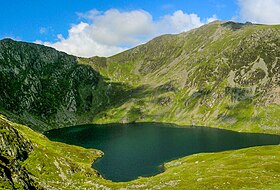Cadair Idris
| Cadair Idris | |
|---|---|

Llyn Cau within the steep rock walls of Craig Cau. Penygadair, the summit of the mountain, is to the right
|
|
| Highest point | |
| Elevation | 893 m (2,930 ft) |
| Prominence | 608 m (1,995 ft) |
| Parent peak | Aran Fawddwy |
| Listing | Marilyn, Hewitt, Nuttall |
| Naming | |
| Translation | Chair of Idris (Welsh) |
| Pronunciation | Welsh: [ˈkadair ˈɪdrɪs] |
| Geography | |
| Location | Gwynedd, United Kingdom |
| Parent range | Snowdonia |
| OS grid | SH711130 |
| Topo map | OS Landranger 124, Explorer OL23 |
| Climbing | |
| Easiest route | Hike |
| Listed summits of Cadair Idris | ||||
| Name | Grid ref | Height | Status | |
|---|---|---|---|---|
| Mynydd Moel | SH727136 | 863 metres (2,831 ft) |
Hewitt Nuttall |
|
| Cyfrwy | SH703133 | 811 metres (2,661 ft) |
Hewitt Nuttall |
|
| Craig Cwm Amarch | SH710121 | 791 metres (2,595 ft) |
Hewitt Nuttall |
|
| Gau Graig | SH744141 | 684 metres (2,244 ft) |
Hewitt Nuttall |
|
| Tyrrau Mawr | SH677135 | 661 metres (2,169 ft) |
Hewitt Nuttall |
|
| Craig-y-llyn | SH677135 | 622 metres (2,041 ft) |
Hewitt Nuttall |
|
Cadair Idris or Cader Idris is a mountain in Gwynedd, Wales, which lies at the southern end of the Snowdonia National Park near the town of Dolgellau. The peak, which is one of the most popular in Wales for walkers and hikers, is composed largely of Ordovician igneous rocks, with classic glacial erosion features such as cwms, moraines, striated rocks, and roches moutonnées.
Cadair Idris means 'Idris's Chair'. Idris is usually taken to be the name of a giant or, alternatively, it may refer to Idris ap Gwyddno (or Gweiddno), a 7th-century prince of Meirionnydd who won a battle against the Irish on the mountain. Idris ap Gwyddno was in fact referred to as Idris Gawr ("Idris the Giant") in some mediaeval genealogies of Meirionydd.
The basic meaning of the word cadair (Middle Welsh/Early Modern Welsh kadeir or cadeir) is 'seat, chair' (borrowed from the Latin cathedra 'chair'). In place names cadair can mean 'stronghold, fort, fortress' or 'mountain or hill shaped like a chair'. The spelling cader represents a spoken variant of the standard form cadair.
It appears that Cadair/Cadeir Idris is the form used in the earliest Welsh-language sources. In a poem in his own hand in the second half of the fifteenth century, the poet Lewys Glyn Cothi wrote 'Dros gadair idris gedy' ('and then over Cadair Idris'). Around 1600, John Jones of Gellilyfdy referred to 'y mynydh neu bhan neu bhoel a elwir Cadeir Idris' ('the mountain, peak or hill known as Cadeir Idris'.
...
Wikipedia
